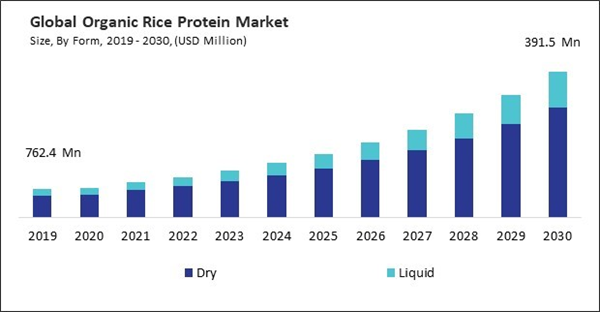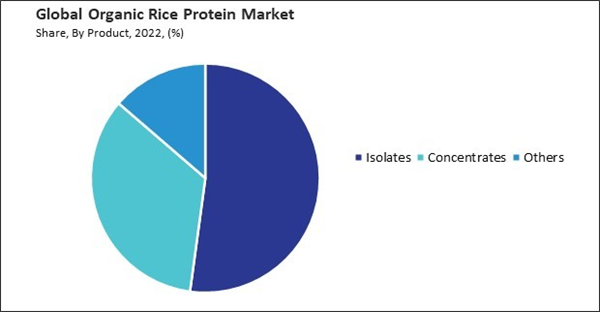As the popularity of plant-based diets rises globally, Asia Pacific is no exception. This protein can be integrated into traditional Asian recipes, offering a plant-based protein boost to dishes that traditionally rely on animal proteins. Consequently, the Asia Pacific region would acquire nearly, 30% of the total market share by 2030. Urbanization and changing lifestyles in the Asia Pacific are leading to a shift in dietary patterns.
The sports nutrition sector has witnessed a notable preference shift towards plant-based proteins. Athletes and fitness-conscious individuals are seeking alternatives to traditional animal-based protein supplements. The sports nutrition industry is known for innovation in product formulations. Manufacturers are incorporating this protein into various sports nutrition products, including protein powders, bars, shakes, and supplements. Thus, because of the growth of the sports nutrition sector, the market is anticipated to increase significantly. Additionally, Direct-to-consumer (DTC) sales through e-commerce platforms provide consumers convenient access to these protein products from the comfort of their homes. The online platform facilitates the promotion of subscription models, where consumers can subscribe to regular deliveries of these protein products. Hence, expanding e-commerce and direct-to-consumer sales has been a pivotal factor in driving the growth of the market.
However, supply chain challenges, such as weather-related issues, pests, or other factors affecting organic rice cultivation, can lead to inconsistent supply and availability. This directly impacts the production of this protein, leading to fluctuations in the market. Supply chain challenges can limit the variety of this protein products available. Thus, supply chain challenges can slow down the growth of the market.
By Form Analysis
By form, the market is categorized into dry and liquid. The liquid segment covered 22% revenue share in the market in 2022. Liquid protein is easy to incorporate into formulations, allowing manufacturers to create various products without extensive processing. It can seamlessly blend into beverages, sauces, dressings, and other liquid-based products.By Product Analysis
Based on product, the market is classified into isolates, concentrates, and others. The concentrates segment acquired a 30% revenue share in the market in 2022. Concentrates are commonly used in beverage applications, including protein shakes, smoothies, and ready-to-drink products. They provide a plant-based protein source that can be easily incorporated into beverages, catering to consumers seeking protein fortification in their drinks.By Application Analysis
On the basis of application, the market is divided into sports & energy nutrition, bakery & confectionery, meat analogs & extenders, dairy alternatives, and others. The bakery & confectionery segment garnered 16% revenue share in the market in 2022. The demand for healthier snack options has led to incorporating this protein into nutrition bars and snacks. These bars and snacks offer a convenient way for consumers to enjoy a tasty treat while meeting their protein requirements.By Regional Analysis
Region-wise, the market is analysed across North America, Europe, Asia Pacific, and LAMEA. In 2022, the North America region led the market by generating 36% revenue share. North America has witnessed a significant shift in dietary preferences, with an increasing number of consumers embracing plant-based diets. Health-conscious consumers in North America are seeking protein options that meet their nutritional needs and offer additional health benefits.List of Key Companies Profiled
- Axiom Foods, Inc.
- GlobalRidge LLC (NutriBiotic)
- Golden Grain Group Limited
- The Green Labs LLC
- North Coast Naturals
- Kerry Group plc
- A.COSTANTINO & C. SPA
- Südzucker AG
- ETChem
- The Scoular Company
Market Report Segmentation
By Form (Volume, Tonnes, USD Million, 2019-2030)- Dry
- Liquid
- Isolates
- Concentrates
- Others
- Sports & Energy Nutrition
- Bakery & Confectionery
- Meat Analogs & Extenders
- Dairy Alternatives
- Others
- North America
- US
- Canada
- Mexico
- Rest of North America
- Europe
- Germany
- UK
- France
- Russia
- Spain
- Italy
- Rest of Europe
- Asia Pacific
- China
- Japan
- India
- South Korea
- Singapore
- Malaysia
- Rest of Asia Pacific
- LAMEA
- Brazil
- Argentina
- UAE
- Saudi Arabia
- South Africa
- Nigeria
- Rest of LAMEA
Table of Contents
Companies Mentioned
- Axiom Foods, Inc.
- GlobalRidge LLC (NutriBiotic)
- Golden Grain Group Limited
- The Green Labs LLC
- North Coast Naturals
- Kerry Group plc
- A. COSTANTINO & C. SPA
- Südzucker AG
- ETChem
- The Scoular Company










